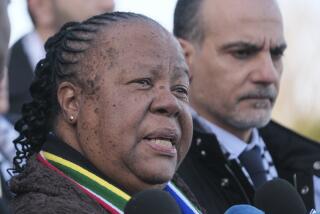Foes Say Detention Bill Would Allow Apartheid-Era Abuses
JOHANNESBURG, South Africa â Rights activists and opposition politicians here are up in arms over proposed legislation that would allow suspected terrorists to be detained and interrogated for 14 days without charge or trial.
Government officials argue that the absence of specific anti-terrorism laws has made South Africa a haven for international terrorists and fugitives. The legislation also would provide for harsher sentences for people convicted of terrorism.
But activists called the bill âoutrageousâ and insisted that it mirrored laws used by the former apartheid regime to stifle dissent.
âAnybody could be just picked up, arrested, detained [and] tortured without anybody having access to a court for any number of days,â said Suleman Lockhat, chairman of the Assn. of Lawyers for Islamic Law and a civil rights activist. âThis can give rise to abuse.â
âThis infringes on a string of constitutional rights, starting with the right of arrested people to remain silent,â said Dene Smuts, a spokeswoman for the opposition Democratic Alliance.
The bill put forth by the government contains proposals that the South African Law Commission, which helps bring legislation into line with the constitution, received from a cross-section of society, including religious organizations, human rights groups and lawyers.
The commission, however, said that it has found no good reason for detaining suspects without compelling evidence and that conventional policing methods have not been deemed inadequate for dealing with terrorists.
âThe question is whether we have the necessary justification for such a drastic proposal,â Law Commission researcher Pierre van Wyk said.
Justice Ministry spokesman Paul Setsetse stressed that the bill was merely a draft and that the government had no intention of promoting measures that were unconstitutional or in conflict with international standards of human rights.
The absence of specific legislation outlawing terrorism has made it difficult for South Africa to tackle transnational crimes and abide by international protocols dealing with terrorism.
As it stands now, terrorism suspects may be charged only with common-law crimes such as malicious damage to property, arson, murder or attempted murder, and this complicates extradition of accused terrorists, officials said. Furthermore, terrorism suspects now may be held for only 48 hours without charge.
âThe government firmly believes we need a law that will enable the law enforcement agencies to detain suspected terrorists for a longer period,â Setsetse said.
Safety and Security Minister Steve Tshwete said recently that 400 foreign-based organized crime syndicates were operating in South Africa. Last year, 200 alleged syndicate leaders were arrested, and the government had detained more than 2,300 reputed members of such groups since July.
In recent years, Cape Town has been the target of bombing campaigns in which scores have died. Activists acknowledged the need to crack down on crime but warned that the suggested confinement measure could lead to violations.
âGiven our history of detention and how it has been abused, we should be careful not to go down that road again,â said Jody Kollapen of the South African Human Rights Commission. Under apartheid, the allowed duration of detentions grew from 14 days in the 1960s to an indefinite period in the 1980s.
Although the draft law would allow detainees to be visited by family members, religious leaders or doctors, opponents said this was little consolation.
âThose of us who have spent time in detention know how helpful these [provisions] are. They mean nothing,â said Saber Jazbhay, a Durban-based human rights lawyer. âEspecially when youâre locked up in a room the size of a toilet.â
Another concern is that innocent people might be arbitrarily detained as terrorists.
âA person who may be regarded as a freedom fighter in Palestine may be regarded as a terrorist in another part of the world,â said Lockhat, the Islamic law association leader. âWho is going to make the distinction? Muslims and Islamists might become suspects in this type of episode.â
More to Read
Sign up for Essential California
The most important California stories and recommendations in your inbox every morning.
You may occasionally receive promotional content from the Los Angeles Times.











